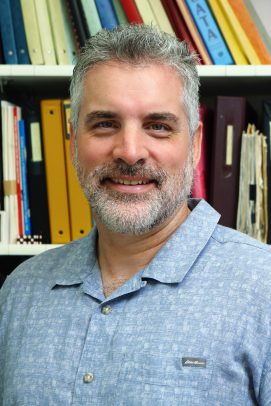Excellence in Teaching: Dale Reed
If there’s one thing Dale Reed never does in class, it’s ask the tired question that can make lecture halls go silent: “Does anyone have any questions?”
“What I do say is, ‘Talk to your partner,’” said Reed, clinical professor in computer science.
If that doesn’t keep people engaged, his other go-to methods do — like surprise money for in-class participation, repetitions of programming functions in chipmunk voices and problem-solving opportunities.
“[Students] never know what’s going to happen,” said Reed, smiling.
But his spontaneity shouldn’t be confused with randomness.
The 20-year teaching veteran’s interactive and inquiry-based teaching strategies are carefully put together to inspire permanent, powerful learning experiences.
“Everybody in the room is talking to each other,” Reed said, describing a typical class, “furiously trying to engage, understand a question, grappling with it, guessing right or wrong. Their brain is very active. So when the answer comes, it makes their brain sticky. They’ll remember.”
His planning and style have earned him 4.2 and 4.5 ratings for course quality and teaching evaluations from his department, where the average is 3.5. During his time at UIC, Reed has won the Faculty Teaching, Teaching Recognition Program, INSPIRE and Silver Circle awards, and more.
The recognition is proof of what Reed describes as a lifelong, informal crusade. His mission is to become a better teacher — and change the lives of students. That’s what first inspired him to do postdoctoral work at Northwestern University, where he earned a master’s and Ph.D. in computer science.
Reed also works with high school teachers and has cofounded the Chicago chapter of the Computer Science Teachers Association, creating introductory coding classes for high schools. He was part of a committee that designed an Advanced Placement Computer Science Principles curriculum and exam.
At UIC, he developed a similar version of the class and later revamped the department’s Computer Ethics and Technical Communications course.
Reed has worked to increase UIC CS enrollment, giving presentations to about 10,000 high school students and growing the department from 185 students in 2005 to more than 1,060 in 2017.
He is focused on helping UIC students graduate. In the past, he’s secured approximately $600,000 in NSF scholarship funding for computer science students; some work for industry leaders like Google now.
“It was very successful,” said Reed, expressing his gratitude for the amount of support he’s gotten from the department and college.
But the real driving force behind each one of his efforts is that he’s passionate about what he does.
“If you love your students and you want what’s best for them, you’ll be motivated to go the extra mile,” he said.

